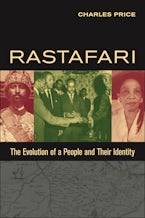Illuminates how the Rastafari movement managed to evolve in the face of severe biases
Misunderstood, misappropriated, belittled: though the Rastafari feature frequently in media and culture, they have most often been misrepresented, their political and religious significance minimized. But they have not been vanquished.
Charles Price’s Rastafari: The Evolution of a People and Their Identity reclaims the rich history of this relatively new world religion. Charting its humble and rebellious roots in Jamaica’s backcountry in the late nineteenth century to the present day, Price explains how Jamaicans’ obsession with the Rastafari wavered from campaigns of violence to appeasement and cooptation. Indeed, he argues that the Rastafari as a political, religious, and cultural movement survived the biases and violence they faced through their race consciousness and uncanny ability to ride the waves of anti-colonialism and Black Power.
This social movement traveled throughout the Caribbean, Africa, Central America, and the United States, capturing the heart and imagination of much of the African diaspora. Rastafari spans the movement’s struggle for autonomy, its multiple campaigns for repatriation to Africa, and its leading role in the Black consciousness movements of the twentieth century. Not satisfied with simply narrating the past, Rastafari also takes on the challenges of gender equality and the commodification of Rastafari culture in the twenty-first century without abandoning its message of equality and empowering the downpressed.
Rastafari shows how this cultural and political context helped to shape the development of a Black collective identity, demonstrating how Rastafarians confronted society-wide ridicule and oppression and emerged prouder and more united, steadfast in their conviction that they were a chosen people.

